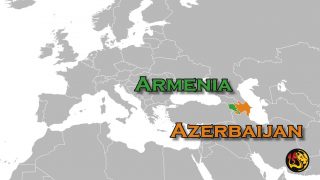
by Worthy News Washington D.C. Bureau Staff
(Worthy News) – Armenia and Azerbaijan signed a historic peace agreement at the White House on Friday, formally ending nearly four decades of territorial conflict and opening a new chapter in South Caucasus geopolitics. The accord, brokered by U.S. President Donald Trump, cements Washington’s strategic foothold in a volatile region bordering Iran and deep within the former Soviet sphere.
Trump hosted Armenian Prime Minister Nikol Pashinyan and Azerbaijani President Ilham Aliyev for what he called a “historic peace summit” in Washington. “Many leaders have tried to end the war, with no success–until now, thanks to ‘TRUMP,'” the president wrote on his social media platform.
In a rare show of unity, Aliyev and Pashinyan announced they would jointly nominate Trump for the Nobel Peace Prize.
The two nations–Shiite-majority but secular Azerbaijan, a close Israeli ally, and Christian Armenia — have been locked in a bloody dispute since the collapse of the Soviet Union, most notably over Nagorno-Karabakh. That Armenian-controlled enclave was retaken by Azerbaijan in 2023, prompting the exodus of more than 100,000 ethnic Armenians.
Although negotiators reached terms in March, the signing was delayed over Baku’s demand that Armenia amend its constitution to remove language implying territorial claims. Pashinyan, facing political headwinds at home, eventually agreed.
The ‘TRIPP’ Corridor
At the heart of the agreement is a landmark U.S. infrastructure project: the Trump Route for International Peace and Prosperity — or TRIPP. The multimodal transit corridor will connect mainland Azerbaijan with its Nakhchivan exclave through Armenia’s Syunik Province, bypassing Russia, Iran, and China.
Under the deal, the United States gains exclusive development rights to construct and operate the corridor via a new American-led consortium, while the route remains under Armenian law. This compromise resolves a long-standing dispute over Baku’s desire for an extraterritorial passage and Yerevan’s sovereignty concerns.
“What President Trump has done is he’s taken the politics out of the picture and made common sense prevail,” a senior White House official said. “The losers here are China, Russia, and Iran. The winners are the West.”
Trump is expected to sign a directive establishing a TRIPP negotiating team next week. Nine potential operators, including three American companies, have already expressed interest.
Diplomatic Setback for Moscow
The agreement represents a major strategic setback for the Kremlin, which has long regarded the South Caucasus as its backyard. Russia, tied down by its war in Ukraine, has been unable to assert its influence in the negotiations.
Bilateral Gains and Future Relations
In addition to the peace accord, the U.S. signed bilateral economic agreements with both Armenia and Azerbaijan aimed at expanding trade, energy cooperation, and infrastructure development.
Aliyev thanked Trump for lifting a 33-year-old ban on U.S.-Azerbaijani military cooperation, calling it “a day which will be remembered by the people of Azerbaijan with pride.” Pashinyan praised the deal for “unlocking strategic economic opportunities that will create long-term benefits.”
Both leaders also agreed to formally request the dissolution of the now-defunct Minsk Group, the 1992 body co-chaired by the United States, France, and Russia that sought–unsuccessfully–to resolve the Nagorno-Karabakh conflict.
“It’s been a long time–35 years they fought–and now they’re friends,” Trump said at the signing ceremony. “If you don’t get along, call me, and I’ll straighten it out.”
With the signing of the TRIPP agreement and the normalization of relations, the South Caucasus may finally see the stability that has eluded it since the Soviet collapse–while giving Washington a powerful new position in a region once dominated by Moscow.
Copyright 1999-2026 Worthy News. This article was originally published on Worthy News and was reproduced with permission.
Latest News from Worthy News
A Christian pastor detained in Nicaragua since July 2025 has been released from prison but placed under house arrest along with five other Christian believers, Worthy News established on Thursday.
An injured Christian pastor in eastern India says recalling Bible verses gave him strength to survive hours of brutal abuse by a Hindu mob that accused him of converting Hindus to Christianity.
U.S. forces carried out five sets of precision strikes against Islamic State targets across Syria between Jan. 27 and Feb. 2, the U.S. military’s U.S. Central Command announced Wednesday.
U.S. forces carried out five sets of precision strikes against Islamic State targets across Syria between Jan. 27 and Feb. 2, the U.S. military’s U.S. Central Command announced Wednesday.
U.S. Special Envoy Steve Witkoff announced on Feb. 5 that Ukraine and Russia have agreed to exchange 314 prisoners, marking the first such swap in five months and the most tangible outcome yet from U.S.-brokered talks held in Abu Dhabi. The exchange followed multiple days of trilateral negotiations involving delegations from Washington, Kyiv, and Moscow.
The Supreme Court of the United States on Wednesday declined to take up a legal challenge to California’s newly drawn congressional map, allowing the state to proceed with district lines that effectively eliminate five Republican-held U.S. House seats.
President Donald Trump said Thursday that Iran has entered negotiations with the United States because it fears potential military action, as both sides prepare for high-stakes talks expected to take place in Oman. Speaking at the National Prayer Breakfast in Washington, Trump said Tehran “doesn’t want us to hit them,” adding that a U.S. naval fleet is in the region as pressure increases.






